Since announcing I was pregnant, far and away the most common question I've received has been, "What sorts of meals are you eating to keep up with the increased protein needs in pregnancy?" The second most asked question has been, "What supplements are you taking?" So, without further ado, here you'll find the nitty gritty details on what I have (and haven't) been eating as well as what supplements I've been taking to support a healthy vegan pregnancy.
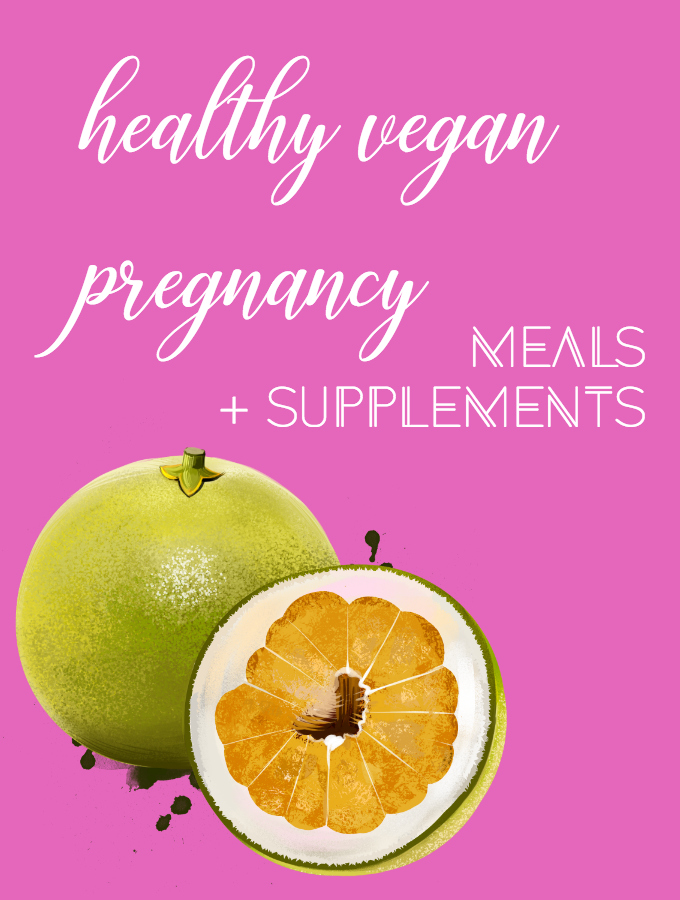
Two notes: 1) This post contains affiliate links. Purchasing via affiliate links supports Blissful Basil at no additional cost to you. 2) I hold a certificate in plant-based nutrition, but I'm not a nutritionist or medical doctor. Thus, the below is not intended to be taken as medical or nutrition advice. Please, use the below information at your own discretion, and when in doubt, always consult your physician.
About a month ago, I asked you all to share your most burning vegan pregnancy questions with me on Instagram, and I received an abundance of thoughtfully phrased inquiries on the topic.
Most of the questions I received pertained to protein, meals, and supplements to support a healthy vegan pregnancy, but I also received questions about healthy, natural pregnancy in general (as opposed to being directly related to veganism). For instance, questions popped up about my prenatal exercise routine, which self-care and beauty products I've been using, and birth + parenting preparation. There were even preemptive requests for posts about postpartum recovery and breastfeeding.
I'll be addressing all of the above in a series of four posts under the overarching title of "healthy vegan pregnancy", but really, truly these posts will seek to share my overall approach to a healthy, natural pregnancy in general. Point being: Whether you identify as vegan or not, my hope is that you'll find this series of pregnancy posts to be welcoming, supportive, and informative!
This first post will outline what I have (and haven't) been eating as well as the supplements I've been taking to support a healthy pregnancy.
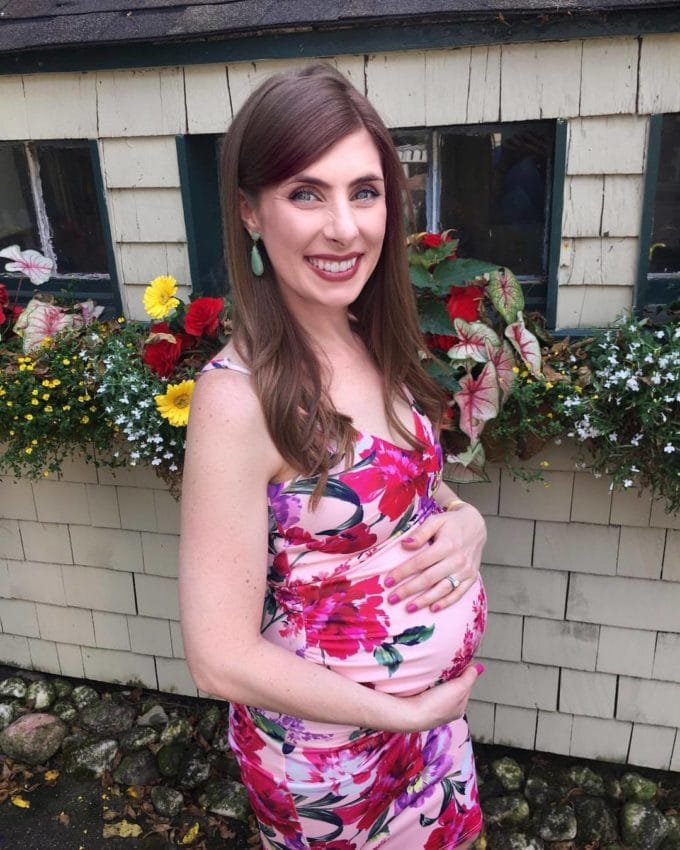
29 Weeks Pregnant
Protein Needs During Pregnancy
Confession: My non-pregnant self pays very little attention to how much protein I consume on a daily basis. Of course, I make sure to seek out protein from a variety of plant-based sources but other than that, I've never felt the need to hem and haw about protein much.
Having said that, after finding out I was pregnant, I was immediately overcome by a motherly urge to be more mindful about protein consumption.
Although there's a small bit of variation in the literature, most reputable sources agree that pregnant and breastfeeding women should be consuming, on average, 70 grams of protein per day.
For those regularly consuming meat and dairy, this number is a pretty easy target; however, for vegans, consuming 70 grams of protein takes a little more thought and effort. It's completely and totally do-able though.
Looking at my pre-pregnancy diet, I estimated I was consuming between 40 and 50 grams of plant-based protein most days. Thus, I simply needed to add another 20+ grams, and I'd be good to go.
I found the easiest way to accomplish this was to add protein powder to my smoothie each morning.
The catch here, especially when you're pregnant, is to choose wisely when it comes to protein powders. You want to stay away from anything with artificial colors, flavors, and sweeteners. The simpler, the better in my opinion. Also, if possible, choose a plant-based protein that offers a complete amino acid profile.
My go-to, tried-and-true favorite plant-based protein is Sprout Living's Pumpkin Seed Protein. It's made with one ingredient (pumpkin seeds) and is a complete protein source, offering 19 grams of plant-based protein per two-scoop serving. It's the only protein powder I use. The one thing to keep in mind is that it's not the kind of protein powder that you can simply add water to and gulp down. It's best added to fruit- and/or veggie-based smoothies and blended until smooth.
Sample Vegan Pregnancy Meal Plan
Please keep in mind that the below is a mere snapshot of one day of plant-based eating while pregnant. There were certainly days during my pregnancy when I would have blushed had my meals been tracked (think: cookie dough for lunch and then again for dessert after a dinner of Mary's Gone Crackers and hummus—pregnancy cravings can be quite powerful). But such is life, and this isn't about pristine living or perfection.
Also of noteworthy importance: My appetite waxed and waned considerably throughout pregnancy with peaks during the first few weeks, beginning to middle of the second trimester, and middle of the third trimester. The day I tracked meals for this post was during a hungrier (and sweeter) stint in the third trimester.
(And because some of you have asked, my weight gain thus far has been textbook—I'm nearly 37 weeks along and have gained 23 pounds, my labs have all come back normal and healthy, and last the doctor checked, our sweet little one was measuring at the 75th percentile across the board.)
Breakfast | Protein smoothie made with two frozen bananas, 1 cup frozen wild blueberries, 1 cup frozen cauliflower, 2 scoops pumpkin seed protein powder, 1 cup unsweetened almond milk (plus filtered water as needed). 25g protein, 19g dietary fiber, 1205mg Potassium, 118% DV vitamin C, 54% DV Calcium, 54% DV Iron, 20% DV vitamin A
Mid-Morning Snack | Pink lady apple with 2 tablespoons almond butter. 7g protein, 6g dietary fiber, 148mg Potassium, 8% DV vitamin C, 9% DV Calcium, 9% DV Iron, 1% DV vitamin A
Lunch | Lentil salad (with about 1 cup cooked lentils) + a dollop of hummus. 20g protein, 18g dietary fiber, 731mg Potassium, 37% DV Iron, 4% DV Calcium, 5% DV vitamin C
Mid-Afternoon Snack | 1 cup red grapes + 1 cup strawberries. 2g protein, 5g dietary fiber, 601mg Potassium, 58% DV vitamin A, 159% DV vitamin C, 5% DV calcium, 8% DV iron
Dinner | Burrito bowl with 1 cup cooked brown rice, ½ cup cooked pinto beans, 3 ounces scrambled extra-firm tofu, pico de gallo, ½ mashed avocado, 1 cup romaine. 23g protein, 19g dietary fiber, 963mg Potassium, 90% DV vitamin C, 22% DV calcium, 33% DV Iron
Dessert | A few (or more) nibbles of dark chocolate. 2g protein, 4g dietary fiber, 2% DV calcium, 5% DV Iron
TOTAL PROTEIN: 79g
TOTAL FIBER: 71g
TOTAL IRON: 146% DV
TOTAL CALCIUM: 96% DV
A NOTE ABOUT PROTEIN | Some days I ate a little more protein than outlined above, some days I ate much less. Rather than obsessing over what I was consuming daily, I aimed to consume an average of 60–70g daily over the course of several days to a week. Overall, I felt best when I mixed and matched protein sources, ensuring I consumed a wide array of protein-rich whole foods throughout the course of each week.
A NOTE ABOUT CARBOHYDRATES | I'm not the slightest bit afraid of carbs (or natural sugars, for that matter), and unless you have a medical reason to be avoiding them, you shouldn't be either. Carbohydrates are an incredible fuel source in general but especially during pregnancy. In fact, animal studies have shown that low carbohydrate diets during pregnancy result in lower birth weights and alterations in embryonic organ growth that may be associated with organ dysfunction and behavioral changes in postnatal life. The catch with carbs, of course, is to ensure that most of the carbohydrates you're consuming are complex (rather than refined). Doing so will provide your body with a more stable source of glucose rather than spiking your blood sugar levels. Think: fiber-rich fruits, whole grains and seeds (e.g., brown rice, buckwheat, millet, quinoa, oats), sweet potatoes, legumes (e.g., peas, chickpeas, lentils), etc.
A NOTE ABOUT DIETARY FIBER | Dietary fiber is always your friend but especially during pregnancy. Consume lots of it. Your tummy will thank you for it. The hormone progesterone, which is released in abundance during pregnancy, slows digestion to ensure your body is absorbing all possible nutrients from the foods you're consuming. Sounds great, right? Well, mostly yes and a little no. Yes, because more nutrients to your baby and you = a great thing. No, because slowed digestion can lead to some serious constipation. And to put it bluntly: pooping is important. It detoxifies the body and allows you to carry on with your day without feeling backed up and weighed down. What helps you poop? Fiber + water. (Dairy and meat tend to exacerbate constipation.) Make sure you're consuming at least 25g of dietary fiber each day during pregnancy and drinking plenty of filtered water (around 10–12 cups per day is the amount recommended for pregnant women). Note: Those following a plant-based diet typically surpass the daily fiber target with ease thanks to all those complex carbs, fruits, and veggies.
Dealing with Naysayers
In my experience, most people have been overwhelmingly supportive of my decision to follow a plant-based vegan diet—both before pregnancy and during. Having said that, whether you're pregnant or not, there are always going to be naysayers and questioners.
Here are my thoughts on dealing with and responding to the commonly asked questions + unsolicited criticisms from the unsupportive few:
Unsupportive Doctors or Midwives
I started my pregnancy with an OBGYN practice and then switched to a Midwife group around week 33 (more on that decision in the third installment of this series), and have been lucky that both my doctor and midwife have been incredibly supportive.
In fact, my doctor's reaction when I reminded her that I'm vegan was, "Awesome! Makes my job easier because now I don't have to remind you of all the things you need to avoid eating, like undercooked meat/eggs, unpasteurized cheeses, deli meat, etc." She had absolutely no concerns about me getting enough protein, and simply told me to strive for an average of 60–70 grams of protein a day but not to worry if some days I fall short.
The midwife group I'm with now also fully supports a plant-based approach to pregnancy and didn't even flinch when I mentioned it. In fact, they even have a dropdown box in their online questionnaire where patients can note that they follow a vegan diet.
My point in outlining how supportive both my OBGYN and Midwife have been is simply to say that there are plenty of doctors/midwifes out there who won't hesitate to support you in maintaining a vegan diet during pregnancy. If you find that yours is particularly unsupportive, I'd consider parting ways and looking elsewhere.
Less-Than-Supportive Friends + Family Members
In my experience, less-than-supportive friends and family members are always well-meaning in their naysayer approach, but it doesn't make their questioning any less upsetting.
I've found it's best to keep answers short, sweet, and as non-defensive as possible. If you have a supportive doctor or midwife, then simply replying with, "My doctor/midwife fully supports me and has no concerns with my choice to maintain a vegan diet during pregnancy," is often enough to quell the question game.
Tips for Responding to Commonly Asked Questions + Concerns
Where do you get your protein?
Patience is a virtue here. No one cares a lick about where other people get their protein unless, of course, those other people are vegan. Then, everyone you encounter assumes you're on the verge of a protein deficiency. Yet have you ever met or heard of anyone (who consumes an adequate number of calories) with a protein deficiency? I certainly haven't and doctors haven't either. Many of the largest mammals on earth—including giraffes, elephants, and cows—are grown solely with plant protein, so surely plants have sufficient protein sources to grow us much smaller humans and human babies, too.
When asked this question, typically what happens is that once I start listing all of the foods from which I get my protein (e.g., beans, lentils, tofu, leafy greens, oats, brown rice, nuts, seeds, split peas, etc.), people almost immediately become bored and no longer seem to care.
The key is to entertain the question as authentically, non-defensively, and open-mindedly as possible. Defensiveness only breeds more questioning.
Where do you get your calcium?
Dark, leafy greens, broccoli, beans, calcium-fortified foods (e.g., plant-based milk), blackstrap molasses, oatmeal, almond butter, bok choy, dried figs.
Where do you get your iron?
Dark, leafy greens, tofu, quinoa, oats, buckwheat, millet, beans, cashews, lentils, dried fruit (dried peaches, prunes, and apricots offer an abundance of iron), dark chocolate and cacao powder.
An Extra-Long Note About Morning Sickness
If you're anything like most pregnant women (myself included), you'll find yourself overcome with a near-constant urge to hurl during the first trimester.
I felt great for the first few weeks of pregnancy and was convinced I'd be in the lucky 30% of women who don't experience morning sickness. HA! Wrong. So wrong.
Exactly at the six-week mark, I went from feeling energetic and extra hungry to lethargic and riddled with food aversions. Like most women who've experienced "morning sickness," I felt sick not only in the mornings but 'round the clock. In fact, most days, the nausea peaked in the evening hours.
If you've never experienced morning sickness, allow me to paint the picture for you. Imagine being hungover 24 hours a day, seven days a week, only you haven't been able to partake in the fun part of creating said unrelenting hangover.
Most women experience relief from morning sickness at the start of the second trimester (i.e., 14-week mark), however, some find that it lingers on throughout their entire pregnancy. I was lucky to experience relief starting around week 14 but continued to have good days and bad days up until I was about 18 weeks pregnant.
For me, the worst part about morning sickness was the food aversions.
When I first found out I was pregnant, I was excited to up my nutritional game even further, and filled my plate with a rainbow of goodness at every meal. Green smoothies and protein-packed veggie smoothies abounded, crispy cruciferous veggies led the charge on my cravings, and I had little interest in anything processed.
Well, that all changed once Miss Morning Sickness made herself known.
I went from craving veggies to feeling sick to my stomach at even the thought of them. Chickpeas induced a wave of nausea on command. The sight of meat and dairy made my stomach turn more than usual. The smell of coffee sent me running from the kitchen. And anything green made me want to puke. I could hardly be in the same room with avocados or kale for a solid eight weeks. Carrots, steamed cauliflower, and canned artichokes were the only vegetables I could stomach on a regular basis.
What did I want to eat instead?
Pretty much anything white and devoid of most nutrients, including bagels/toast with vegan butter, cookie dough, oyster crackers, and white rice (until I developed an aversion to it). Most days, I encouraged myself to also eat a few of the more nutritious things I could stomach at the time, including one of the three vegetables I could tolerate, pineapple (until I developed an aversion to it), coconut yogurt (with fruit compote if I was feeling extra brave), oatmeal, plain applesauce, apples, bananas, blueberries, and strawberries.
Rambling here, but I do have a point.
My point is that, yes, it's important to eat a wide array of nutritious foods during pregnancy, but please, don't beat yourself up if you're unable to do so, especially early on when morning sickness is at its fiercest.
I went through a period of feeling guilty about all the bread and bagels I was consuming. Not because I was worried about how they'd affect me, but because I worried that this precious little one wasn't getting the beautiful, optimal array of nutrients I'd hoped to supply her with early on.
After a few weeks of feeling guilty, I reminded myself that I was, in fact, doing the best I could given my circumstances.
I was diligent about taking my prenatal vitamins. I was regularly exercising and moving my body. I was meditating. I was staying hydrated (ice water only, please—room temperature water was a major nausea trigger). For years leading up to the pregnancy, I'd fueled my body with a colorful array of fruits and veggies.
From there on out, I stopped fretting and worrying and trusted that my body was guiding me to eat the foods I needed to eat at that moment in time. And that was enough. More than enough, in fact.
Once I started to feel better, I reintroduced vegetables into my diet. And interestingly, once the aversions fell away, I craved greens like crazy. And by "crazy," I mean more than I have in my entire life. Making up for lost time, I suppose.
Bottom line: If you're not able to eat as colorfully as you'd hoped, you find yourself falling a bit shy of those protein requirements, or you're too nauseous to eat much of anything at all, please, above all else, make sure you offer yourself plenty of self-compassion.
Rest, take care, and TRUST that you and your body are doing the best they can given all the miraculous (yet sometimes difficult) changes you're undergoing during this particular season of life and pregnancy.
Foods + Non-Foods to Avoid During Pregnancy
In addition to avoiding the foods I was averse to as well all meat/dairy/non-vegan foods, there are several other foods + non-foods I've avoided consuming altogether during pregnancy. Below you'll find a non-exhaustive list of the foods (and food-related items) it's recommended pregnant women avoid.
Unwashed fruits + veggies. It's always important to thoroughly wash fruits and vegetables before consuming them but especially during pregnancy to avoid potential toxoplasmosis contaminants as well as other potentially harmful chemicals and residues. Some veggies (e.g., lettuces and cabbages) should be consumed with extra caution, because they're more difficult to wash than others. This hasn't stopped me from consuming them during pregnancy, but I do make sure to double and sometimes triple wash leafier veggies.
Raw sprouts. I love sprouts, so this one bums me out. It's important to avoid all types of raw sprouts because they're highly prone to contamination with listeria, salmonella, and E.coli bacteria.
Unpasteurized juices. Yes, I'm talkin' 'bout you, green juice. Some juices are pasteurized, some aren't. Be sure to avoid any unpasteurized fruit and vegetable juices during pregnancy, including packaged ones, because they could carry harmful bacteria.
Certain herbal teas. I've enjoyed matcha lattés one, two, and sometimes even three times each week since about the 18-week mark of pregnancy (prior to that, I had a major aversion to all caffeine) as well as the occasional chai tea latté or glass of iced tea. All of which are generally considered to be safe in moderation during pregnancy. That being said, both green tea and black tea can interfere with folate/folic acid absorption, so I take my prenatal vitamins at night to avoid this potential interaction.
Beyond green and black tea, some of the more herbaceous teas move into mirkier territory when it comes to safety in pregnancy. Personally, I've found it easier to just avoid herbal teas altogether than scrutinize ingredient lists and research everything individually. That being said, some stand-out herbs to avoid during pregnancy are:
» Ephedra, angelica, kava kava, yohimbe, cohosh, dong quai, borage oil, pennyroyal, and mugwort (uterine stimulants). Comfrey, black walnut, cascara sagrada, fenugreek, echinacea, goldenseal, horsetail, licorice root, saw palmetto, senna, motherwort, St. John's wort, shepherd's purse, wormwood, tansy, and uva ursi (linked to miscarriage).
Certain herb- and root-based supplements. Licorice root, rhubarb root, and turmeric root (in concentrated doses—cooking with turmeric is considered safe) are contraindicated in pregnancy.
Artificial sweeteners (i.e., Aspartame). As a once self-proclaimed diet coke addict, I'm proud to say it's been nearly five years since I've had a diet soda. I know firsthand how difficult it is to kick the artificial sweeteners, but you absolutely should. Not only for your own health but also for your baby's. Aspartame is broken down in the human body to methanol and then converted into formaldehyde. Yes, formaldehyde, a known carcinogen. Formaldehyde is a "sticky" molecule capable of latching on to almost any molecule in your body, thereby prompting the immune system to self-destruct its own tissue. Although aspartame has been declared "safe" by the FDA, the CDC warns that methanol (what aspartame is broken down into) "may cause birth defects of the central nervous system in humans." Furthermore, multiple animal studies have demonstrated that methanol damages the neurological system of a developing fetus. Scary stuff. Stay away from it.
Acetaminophen (i.e., Tylenol). This is a controversial one because most OBGYNs will tell you that Tylenol is the "safe" pain reliever to take during pregnancy (mine did). Most pediatricians will also tell you that Tylenol is the safest pain reliever and fever reducer to offer your little one outside the womb. However, evidence from peer-reviewed research studies strongly suggests otherwise. And as someone who's evaluated the minds of hundreds of developing youth, I have to say that the evidence linking acetaminophen to developmental delays and learning disorders is incredibly compelling. To very briefly summarize, Tylenol depletes the body's glutathione stores, and glutathione is a highly important antioxidant molecule responsible for detoxifying the body. But don't just take my word for it. I suggest you do your own research and make an informed, empowered decision. I've never been one to follow a doctor's orders without first doing my own research and weighing the risks/benefits. This is your body, your baby. Inform yourself and make an educated, evidence-based decision. I recommend starting here, here, here, and here, and then digging deeper into the studies referenced within those snippet articles.
Thoughts on Caffeine + Kombucha
Caffeine. Caffeine is generally considered safe in moderation (i.e., less than 200mg per day) during pregnancy. Personally, I had a major aversion to all caffeine-containing beverages up until my morning sickness completely cleared out around the 18th week. Since then, I've enjoyed matcha and chai lattés a couple times each week as well as the rare ½ cup of coffee (can't seem to finish a full cup these days).
That being said, I'm lucky to be working from home (on leave from my position as a psychologist), so I've had the luxury of taking a mid-day nap when needed and simply working later to make up for it. Had I been working my usual 7am–4pm hours without the ability to nap when needed, I have a feeling I would have leaned on caffeine a bit more throughout this pregnancy.
Kombucha. This is another controversial topic and again, I implore you to do your own research. The reason kombucha is controversial is because it's fermented, and fermenting beverages creates alcohol. In the case of kombucha, there's less than 0.5% alcohol by volume, which is consistent with beverages deemed to be "non-alcoholic" (e.g., non-alcoholic beer + wine). It's also consistent with the amount of alcohol that would be created if you left a glass of orange juice out on the counter to ferment overnight. Just as I've enjoyed the occasional non-alcoholic beer during pregnancy, I've also enjoyed the occasional bottle of kombucha. I've probably had about 10 bottles total of kombucha throughout pregnancy (give or take a few), and I'm totally comfortable with that. If you, on the other hand, have to think twice about it, don't do it. Simple as that.
Prenatal Supplements
General Prenatal Vitamin
UPDATE (2019): I took Baby & Me 2 prenatal vitamins during my pregnancy in 2017 and highly recommended them. Unfortunately, I recently found out that they're not actually vegan as their D3 is sourced from Lanolin (sheep's wool). I have yet to find an alternative that meets all of my standards (i.e., methylated, whole food-based, D3 from vegan source, and contains at least 300mg of Choline). Mama Bird is the closest I've found, but comes in with just 50mg of Choline, so if you take it, make sure you're getting plenty of dietary choline (tough as a vegan) or perhaps adding in a stand-alone choline supplement (check with your OB/Midwife).
UPDATE (2020) Second Pregnancy: I'm currently taking Ritual's Prenanatal Vitamins along with another 2,000 IU vegan vitamin D3 (see below) and one (1) capsule of Nested Naturals Choline. Ritual only contains 50mg choline and while I'm sure they have their reasons for this, it's recommended that pregnant women have about 450mg of choline daily. One (1) capsule of Nested Naturals Choline offers 250mg which puts my total at 300mg daily from supplements (which is the same amount t I took my fwhat Baby and Me 2 offers in their prenatal). The other 150mg I'm working to get from plant-based food sources like beans, broccoli, etc.
If you're still interested in Baby & Me 2, here are my notes on it:
Baby & Me 2 is a real food prenatal that can be taken anytime (before or after meals) without upsetting the stomach. Unlike the original Baby & Me formula that required you to take four tablets per day, the updated Baby & Me 2 formula requires you to take just two tablets per day.
A few standout notes about Baby & Me 2:
» Baby & Me 2 contains Choline, a vital nutrient that's rarely found in prenatal formulas. Choline supports the healthy development of the baby, and is necessary for optimal health of both the nervous system and endocrine system. As a vegan, it can be incredibly challenging to meet the recommended daily intake for Choline in general but especially during pregnancy. Rather than fret about it, I specifically sought out a prenatal that contained Choline to ensure I had a solid base of the nutrient coming in each day.
» Baby & Me 2 also contains methylated forms of Folate (aka the natural form of "folic acid") and B12. You might be thinking, "Who cares?" or "Why do I need a vitamin with methylated folate and B12?" Great questions. A certain percentage of the population (up to 30%) is unable to metabolize unmethylated forms of specific B vitamins, namely Folate and Vitamin B12. Unless you know that you're not in that group, it's best to go with methylated forms of Folate and B12 to ensure the body is sufficiently metabolizing them.
» Speaking of Folate, Baby & Me 2 contains an active form of Folate as opposed to the synthetically derived "folic acid" commonly found in prenatal vitamins. Folate—a necessary vitamin in general but especially during pregnancy—is much preferred to the synthetic "folic acid" (there are even risk factors associated with excessive intake of folic acid—read more here).
I started taking Baby & Me 2 prenatals a month before we started trying to get pregnant, which ended up being about two months before we actually got pregnant. It's a good idea to get a head start on prenatals to ensure you're consuming adequate amounts of all vitamins but especially Folate. Folate deficiency in pregnancy is associated with Neural Tube Defects (i.e., serious birth defects of the spinal cord and the brain that arise during the early development of the embryo). Since the neural tube forms during the very first weeks of pregnancy, it's crucial that your body has ample amounts of Folate floating around the moment you conceive.
B12 Supplement
In addition to the B12 in my general prenatal (8 mcg or 100% DV), I also use MyKind Organics Whole Food B-12 Spray. I've been using this spray for over two years, and it's the only B12 supplement I recommend. One spray daily delivers 500 mcg (8333%) vegan vitamin B12 as methylcobalamin. It's important to note that not all B12 is created equal. There is the far superior B12 as methylocobalamin (i.e., naturally occurring) and the far inferior B12 as cyanocobalamin (i.e., synthetically derived). Unfortunately, cyanocobalamin is the form most commonly found in B12 supplements, so be sure to always check labels. The cyano-compound is of no use to the body and is thus immediately converted to the methyl-compound. Beyond the extra work you're creating for your body if you opt for synthetic B12, there's something else to take note of: although considered too small an amount to be harmful, cyanocobalamin contains a cyanide molecule that your body is forced to remove and eliminate. Yuck.
Vitamin D3
In addition to the 600 IU of vitamin D3 found in my general prenatal, I also take Nordic Naturals Vegan Vitamin D3 (one of the only vegan forms of D3 on the market—D2 isn't nearly as effective). Vitamin D is crucial to brain development and functioning, and yet most American adults and children are deficient in it. I was deficient (severely deficient, in fact) year after year up until I started taking 4,000–5,000 IU of vitamin D3 on a daily basis in 2014. Prior to that, I'd been sticking to the recommended DV of 600 IU (not nearly enough for most modern-day humans). Since upping my supplemented amount of D3, I've been right in the middle of the "healthy range" according to blood tests. (Note: There is such a thing as too much vitamin D3, but you'd likely having to be taking 10,000 IU or more on a daily basis for months in a row to reach toxic levels. When in doubt, always check with a trusted physician and do your own research, too.)
Algae-Based Vegan DHA + EPA
DHA is an omega-3 fatty acid that's essential to babies' brain development. It's most commonly found in the form of fish oil (fish consume their omega-3s in the form of algae); however, the vegan version is algae-based (read: straight from the source and without risk of mercury contamination). It's recommended that pregnant women consume a minimum of 650mg of omega-3s each day, of which 300mg are DHA.
Originally, I was taking Testa Vegan Omega-3 Algae Oil DHA + EPA; however, a month ago I switched to Nested Naturals Vegan Omega-3.
Allow me to explain the switch.
I found it was incredibly difficult to find a high-quality vegan DHA + EPA supplement that was also free from carrageenan (a seaweed-derived thickener that can cause gastrointestinal issues). After searching high and low and coming up short, I ended up settling on Testa's vegan omega-3—a high-quality supplement that, unfortunately, does contain a small amount of carrageenan. I figured it was a tradeoff worth making if it meant I was getting adequate amounts of DHA + EPA.
Having said that, I kept an eye out for a carrageenan-free DHA and finally found one a month or two ago at which point I switched to Nested Naturals Vegan Omega-3. Whereas Testa's omega-3 is completely free from that undesirable deep-sea algae flavor, Nested Naturals is a bit more... how should I put it? Pungent. I recommend taking the capsules with a full glass of water or juice of some sort. That being said, I'm not sure how I would have handled the flavor during the first trimester whilst in the throes of morning sickness. Nested Naturals also has a small amount of green tea extract in it, which as mentioned above, can interfere with absorption of folate, so that's also something to consider when choosing.
Another option is Dr. Fuhrman's DHA + EPA Purity, which was my very first choice early on but essentially impossible for me to find (kept going out of stock) up until just a week or two ago. This one is a very pure, high-quality, citrus-flavored oil, but still many people complain about the fishy flavor of it. It's also more than double the price of the other two.
I guess my point here is that these are the three best vegan omega-3 options I found after lots and lots of searching, but clearly, all three have benefits and drawbacks.
Bottom line: It's incredibly important to take a DHA + EPA supplement during pregnancy, but do your own research on these three and choose the one that's the best fit for you. Or heck, if you find another option altogether, let me know!
Vegan Probiotic
I've been taking Nutrition Now PB8 Vegetarian Probiotic for nearly four years now, and it's worked wonders for me. One thing that's great about this probiotic is that it can be stored in the refrigerator or at room temperature, which makes it convenient for travel and on-the-go supplement consumption. In addition to consuming ample amounts of dietary fiber and water, a probiotic can help fend off uncomfortable constipation during pregnancy.
Iron
I started taking one Solgar Gentle Iron Capsule (25mg) per day when I was around 20 weeks pregnant. Not because I was deficient (my iron levels have thankfully been well within the healthy range throughout pregnancy), but as a preemptive attempt to fend off any deficiencies during the second half of pregnancy. You could certainly start taking an iron supplement as soon as you find out you're pregnant, but you'll likely want to begin supplementation around the halfway mark (i.e., 20 weeks). By then, your stored iron supply (the one your body built up once your period stopped) will be nearly depleted. This is also the time when the baby is most in need of new red blood cells. The combination of these two coinciding factors can put pregnant women at risk of anemia, which is why supplementation is typically necessary at the halfway point.
Side note: Iron is known for being a bit of a nausea-inducer (and can also be constipating), which is pretty much the last thing you want to encounter if you're already feeling a bit of the green pregnancy "glow" thanks to morning sickness. And that's exactly why this particular iron supplement is so great. As its name suggests, it's "gentle" on the stomach. I've been able to take it without any problems at all, and because I'm overly curious, I even tested it on an empty stomach a few times just to see what would happen—didn't upset my stomach one bit!
Calcium
For the most part, I was able to meet the recommended DV of calcium for pregnant women (i.e., 1000 mg) through food sources alone and didn't feel the need to supplement throughout pregnancy. However, I started taking Garden of Life Vitamin Code Raw Calcium about a month ago (around the 33-week mark) in anticipation of breastfeeding (which has the same calcium demands as pregnancy). I like that this is a whole food form of calcium that also contains probiotics and digestive enzymes.
Important note: Calcium is known to inhibit iron absorption, so you'll want to take your calcium supplement at least a few hours before/after you take your iron supplement. I found it was easiest to take my calcium supplement in the mornings and the rest of my vitamins/supplements in the evenings.
Additional Resources
I found this post (from Oh She Glows) and this post (from Ashley's Green Life) to be incredibly helpful in beginning to navigate vegan pregnancy supplements when I first found out I was pregnant.


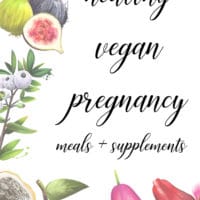
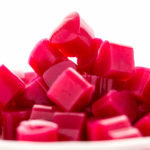


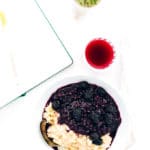

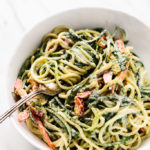
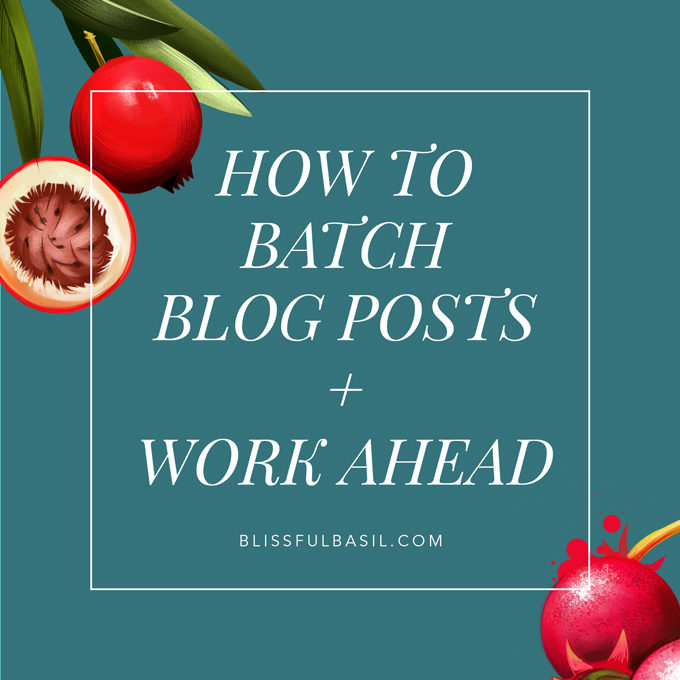

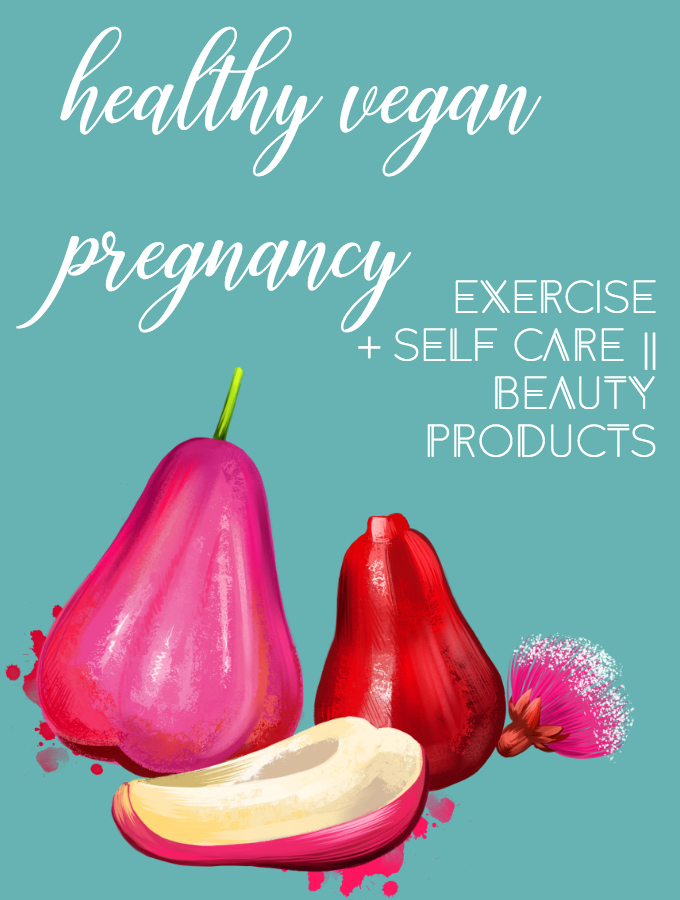
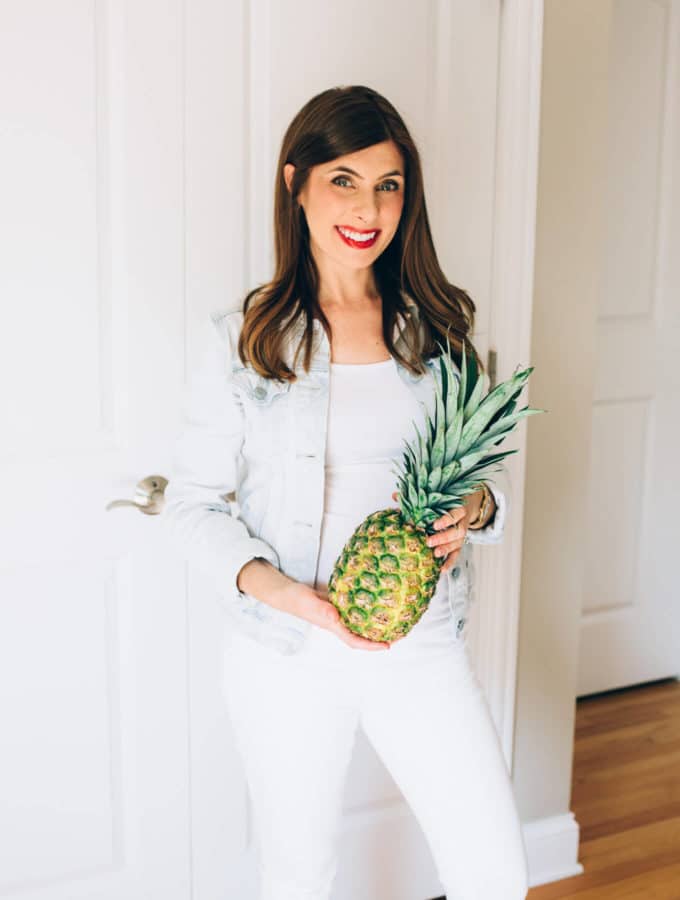
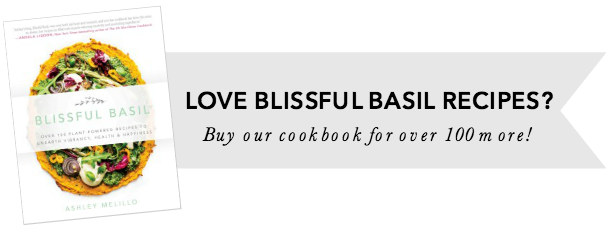
Lynette says
Ashley...you look absolutely beautiful and happy! You looked great not pregnant as well... I know you are close to delivery. Since you are sharing, it gave me the green light to share with you. I have had this voice tell me for a long time to remind you about the Tower Garden aka Apollo and also we share another product called Juice Plus. Have you heard of it? Would love your take on it if you would like info...
Ashley says
Well thank you, Lynette! I haven't heard of the Juice Plus but am going to look into it now—thanks for sharing!
Jessica Vanegas says
Hi Ashley! Thank you so much for your detailed blog on such an important topic. I did want to ask you, if when you had morning or night sickness did you taken anything for that? I find myself so nauseous that I can't even eat a proper meal. I am a bit worried. Hope you and your family are doing great!
Ashley says
Hi, Jessica! You're welcome—so glad you're finding it helpful. I didn't take anything for the nausea. I just ate what I could (lots of white, starchy, bread-y foods) those first couple of months. I found that when I had an empty stomach, the nausea was so much worse, so I ate frequently but in small amounts. All this being said, there are severe forms of morning sickness that a doctor might recommend an OTC medicine for. I was nervous to take anything medication wise during pregnancy, so I didn't but I do know people who have!
Ashley says
Also, I always kept ginger chews and lemon candies in my purse! Those were two things that helped keep the nausea at bay in tougher moments. Also, the smell of fresh lemon was another thing that soothed my stomach. I so feel for you. I never got physically sick, but there were times when I wished I would have just to get some relief.
Jessica Vanegas says
Ashley Hope you had a wonderful Thanksgiving Day! Thank you very much for replying so promptly! And your suggestions, ordering some candies now. If not to much to ask, what are your thoughts on drinking lime and water throughout the day. My normal routine is that every morning and then sometimes after lunch or dinner and one cup of "chamomile tea" in the mornings...I see some conflicting articles on both... Many thanks!
Ashley says
You're welcome! Hope you find some relief with the candies and other tips. As for the lime water, what is the conflicting evidence? I know all teas are in the questionable zone simply because they can't be tested on pregnant women, but I've never heard anything negative about lime and water. Curious as to what the evidence says. That being said, in general, I do think people go a bit overboard warning pregnant women away from EVERYTHING. I say, as long as your doctor/midwife says it's okay and it makes you feel good, then go for it.
Emma says
Hello! First of all, this blog has been a life saver for me since finding out I’m in the early stages of pregnancy. I’ve been vegan for a few months now and I think I’m going to get plenty of disapproving looks and questions when I tell them I’ll still be vegan throughout!
I wanted to ask about the number of vitamins and supplements you took and if it’s possible to over dose on them? It seems that the pregnancy supplements have a lot of the “daily recommended” amounts of d3, iron etc in them but you still took a supplement in addition to this. Was this for any reason or just to ensure you’re getting the right amount of what you need considering your diet? Thank you!
Ashley says
Hi, Emma! So glad you're finding it helpful! Regarding the additional supplements, "daily recommended" amounts are not always indicative of what the body requires to reach optimal levels/functioning. This is especially true with D3 as the RDV is nowhere near the amount that actually keeps serum levels within an optimal range. For years, I took the recommended amount of D3 and was consistently in the "severely deficient" range on blood tests. Then I read Kris Carr's book Crazy Sexy Diet (not at all a diet book despite the name), and there was an entire section on D3 and how RDVs of D3 are so far below what we should actually be taking. Having said this, as noted in my post, D3 is one of the few vitamins that you CAN have too much of, but you'd have to be taking 10,000+IU day after day for many months to reach that point. I regularly take 5,000IU. I took an additional Iron supplement beginning around 20 weeks because I wasn't consuming meat and for the other reasons outlined above. Hope this is helpful! In general though, if you dig into the research on RDVs, you'll find that there isn't a lot of science regarding how they've arrived at those numbers and oftentimes the RDVs are either over or under what actually produces optimal functioning.
Jennifer Bliss says
WOW! What a post! And beautiful photo, too! You're glowing!
Ashley says
Thanks, Jennifer!!
Lindsay says
This is SO incredibly helpful!! Thank you for taking all the time to write about these topics. I'm a fan of doing my own research too, but this literally helps saves hours and hours. xo
Ashley says
My pleasure. So glad you found it helpful, Lindsay! Lots of love! xo
Isa says
I am VERY happy you mentioned and discussed the importance of Folate vs. Folic Acid.
I have MTHFR (as well as a lot of the population that are not aware) and my body cannot break down synthetic vitamins like Folic Acid, and Synthetic forms of vitamins like B6 and B12.
We need more people to speak up regarding synthetic, garbage vitamins! No one needs those and thank you for this post.
Ashley says
Isa, thank you for taking the time to share your thoughts and story—means so much and is very helpful for me and others to hear. The more research I've done, the more I'm surprised by the widespread use of synthetic vitamins. If such a large portion of the population can't bread down synthetic vitamins, why are they the go-to's and defaults in so many supplements?! It's quite unnerving. Just another reason why it's so important to stay informed and advocate for ourselves instead of blindly trusting others to make these decisions for us!
Isa says
YES! It's quite scary how much synthetic vitamins are added to foods it makes me sick! It's in breads, cereals, pasta, and tons of pre-packaged foods!
Why is the go-to synthetic?? Or, why even add it AT ALL???
You would be (I am not sure you - but you in general) surprised at what is in our packaged foods.
I have also suffered through pregnancy losses, which I believe is due to this. The only thing that was found was that I have two copies of MTHFR C677T.
I ordered a bunch of the products you recommended today and I am also taking some Solgar natural forms of Folate, B6, and B12 as well.
I wish there were no synthetic vitamins on the market. There is NO needs for ANYONE to take these..
I really appreciate your post and that you are truly recommending healthy foods and vitamins.
Jackie says
Great information - thank you! I'm vegan and we'll be trying for a baby in the upcoming weeks. I noticed that you say that the prenatal you take is real food, but it appears in the images to have a supplement label. Have you considered or heard of JuicePlus? It is a whole food supplement with a nutrition label. I know many people that have taken it as their sole prenatal instead of a vitamin. Also they recently released a vegan omega that is amazing. I've had both approved as my prenatal nutrition (in addition to the same B12 and D supplements that you use). I'd be happy to connect with you further on the JuicePlus food blends and/or omega. Looking forward to the other e-mails in this series!
Ashley says
Thanks, Jackie! Yes, the Baby & Me is a real food prenatal supplement derived from natural whole foods as opposed to synthetically derived alternatives. I haven’t heard of JuicePlus before but am super intrigued and will definitely check it out. Thanks for the recommendation!
Kim says
Thanks for your super informative post(s). I may be jumping the gun, and this may be obvious - but, are you going to raise your daughter vegan as well? I've got a 13 month old son that I have been raising vegan, and I face such skepticism from most people around me. If you could write another post or series of posts on how and why you may plan to do this, I would LOVE it!
Ashley says
You're welcome, Kim! Yes, we plan to raise her vegan but are also keeping an open mind and respecting the fact that it won't be long before she'll have opinions of her own and a right to choose for herself. Down the road, I'd be happy to put together a post on this very topic. Thank you for the encouragement and the idea. Also, I hear you on the skepticism. It's frustrating enough to have to constantly defend your own dietary choices, and I can only imagine how tiresome it is to have to defend the choices you make for your little one, too. Sending lots of love and encouragement. You, and you alone, know what's best for your little one!
Lucy P says
Thanks for all the tips! We have the same Garden of Life B12 spray and the D3 oil spray too. A great DHA supplement that we’ve been taking is “Nordic Naturals -Algae Omega Vegetarian Omega-3”. It contains 390 DHA and 195 EPA and is completely vegan.
Ashley says
You're welcome! And thanks for the DHA recommendation—will check this one out! Do you know if it has carrageenan in it?
Lacey says
Hi! Love the post- Very helpful! What are your thoughts on iodine supplements? Are they necessary? Thanks!
Ashley says
Hi, Lacey! My prenatal (Baby & Me 2) includes 150mcg of Iodine which is 100% RDV. I believe there was a call for all prenatal vitamins to include supplemental iodine a few years back, so most prenatals should contain iodine. I wouldn't recommend supplementing beyond that (unless directed by your doctor) because excess maternal iodine supplementation can lead to congenital hypothyroidism (http://www.jpeds.com/content/JPEDSConnelly).
Courtney says
I had a quick question regarding your prenatal vitamins and other supplements. Are the pills big? I have such a huge issue with taking pills.
Ashley says
Hi, Courtney! The prenatal pills are definitely on the larger size (most are from my experience).
Ashley says
However, the vitamin d and b12 are drops/spray and the iron, probiotic, and calcium supplement are medium size pills.
Macy says
I'm very interested in your post, but could you elaborate more on how often you took each supplement?
Ashley says
Hi, Macy! I took the supplements daily (unless otherwise noted).
Macy says
I'm preparing to become pregnant as a vegan, and I'm learning from people like you! The topic is not discussed enough.
Ashley says
So glad you're finding the post helpful, Macy! I was so very overwhelmed with this topic when I first found out I was pregnant and my hope with this post was to make it a bit easier and more approachable for others.
Macy says
Thank you for your response!
Ashley says
You're welcome!
Macy says
Did you have an at home birth?
Ashley says
I delivered in an alternative birthing center within a hospital (with a midwife). It's a pretty unique setup and was a great match for me. I knew I wanted to go all natural and also use a birthing tub, both of which they were supportive of. I considered a home birth but am so glad I didn't go that route because I ended up having a fourth-degree tear that required medical attention from an on-call OB.
Macy says
Oh goodness. I hate to hear that. Would you do water birth again?
Ashley says
I went through transition in the tub but didn’t actually birth in it. I’d absolutely use the tub again. Alleviated so much intensity from the contractions!
Macy says
You mentioned starting with Testa omega 3 first then switching to Nesta. Which did you end up preferring? Did either make you sick?
Ashley says
My new favorite is Nutra Veg liquid. Second favorite is Testa.
Macy says
Nested*
Liz says
Does the pumpkin seed hurt your stomach at all? I've tried a bunch of different powders so far and found that a lot of them made my stomach upset, not sure if it was from the powder itself or just being new to protein drinks. I found a good hemp option from Nutiva that seems to be less harsh on my stomach, but just curious to see how the pumpkin seed affected your tummy. Thanks!
Ashley says
Hi, Liz! I've never had stomach trouble with the pumpkin seed protein, especially since it contains just one ingredient and no preservatives or additives. Depending on which fruits and vegetables you're adding to your smoothie, that could be the culprit too. Some people are more sensitive to the combination of certain fruits and vegetables and benefit from a more specific approach to food combining. Hope this helps!
Jasmin says
Thank you for sharing, this was so incredibly insightful. What if I'm making my own green juice at home and sprouting seeds also at home using organic seeds. What is your take on that? Thanks so much! Sending you all my love!
Ashley says
You're welcome, Jasmin! I made my own green juices at home and just took extra care to thoroughly wash the produce going into them. I was a bit wary about sprouting at home, but that was simply my personal take on it!
Melissa says
Oh my goodness! THANK YOU for posting this! I am having the same story, hitting week 6 with massive nausea and only being able to eat plain bread with vegan butter (which I NEVER normally eat!) and occasional fruit. I had started to panic but you brought back down the anxiety and reminded me to be compassionate with myself at this time. I truly appreciate your insight and vitamin recommendations. ❤️
Ashley says
So glad you've found it to be helpful, Melissa! And yes, self-compassion is a must at this time. Hang in there through the nausea! Some things that helped me: Sea Bands (accupressure wrist bands), ginger candies, and near constant snacking. It sounds counterintuitive, but for me the nausea was always worse on an empty stomach. So even when I didn't have an appetite, I made myself eat a little something (e.g., plain saltine crackers) to keep something in my belly. And embrace the white foods! There's a reason your body is craving them.
Agata says
Thanks Ashley - especially for the protein intake tips, it’s a struggle as i stay away from tofu and anything processed including powders but i might check out the pumpkin seed one! On the vegan dha + epa - I’ve found this awesome product from atp science in australia. They certify all ingredients are non gmo organic and really high quality and have done a load of research into their suppliers to guarantee it to be fully vegan, so am using that. Check it out here : https://atpscience.com/product/aurum-oil/
AliWilliams says
Thank you so much for a really thorough and informative piece. I have really struggled to find anything I can rely upon and this was just perfect.
Thank you!
maddy says
Thank you so much for this! It's seriously the most comprehensive post on vegan pregnancy I could find out there~ love what you said about the protein!
Ashley says
My pleasure, Maddy! And thank you for your kind feedback. Means so much to know it's helpful. I remember feeling so overwhelmed trying to wade through all the information when I first found out I was pregnant. Promised I'd do my best to make the vegan pregnancy journey easier for others to navigate if I could. :)
Chrissy says
Hello! I know this post is old but I am in my second pregnancy, my first I was not vegan... but anyway I’ve been taking Ritual Prenatals and was curious if you have heard of them or whay you think? I had a hard time finding one that was truly vegan and had folate vs folic acid. Anyway, I am in the 6th week of food aversions so your post really helped me!!! Thank you!!
Ashley says
Hi, Chrissy! Congrats on your second pregnancy. :)
And no worries about the post being old—I still make updates to it regularly and am always replying to comments.
This is my first time hearing about Ritual Prenantals and after looking into them, I'm impressed. The things I look for in a solid vegan prenatal are: Methylated, strong D3, choline, folate (not folic acid), and B12 as methylcobalamin. This one seems to tick all those boxes. It's methylated. At 2000 IU the D3 count is better than any vegan prenatal I've seen (most have just 800 IU, which isn't enough unless you live in the tropics). Choline is on the low side at just 55mg (pregnant women need 450mg a day and you have to eat a LOT of beans, broccoli, tofu, etc. to get that much as a vegan), but at least it has some (a lot of prenatals don't). It has folate, and a hefty amount of it. And it has B12 in the right form.
I will say, comparing it to the prenatal I took during pregnancy (which I recently found out isn't actually vegan because of the D3 coming from lanolin—see my note in the post), Ritual has a much narrower range of vitamins and minerals within its prenatal. But if you're eating a colorful diet, I don't think this is a problem. Some of the vitamins/minerals this one doesn't have that many other prenatals have: Vitamin A (but you don't want too much supplemented A in pregnancy anyway), Vitamin C, Zinc, Selenium, and Copper. Of the few Ritual is missing, I'd say Vitamin C, Zinc, and selenium are most important but easy enough to side supplement. Zinc can be especially helpful for anxiety (fyi in case you find yourself having any perinatal anxiety).
As with anything, definitely run all this by your physician or midwife! But this is my two cents based on the research I've done over the years. Hope it's helpful!